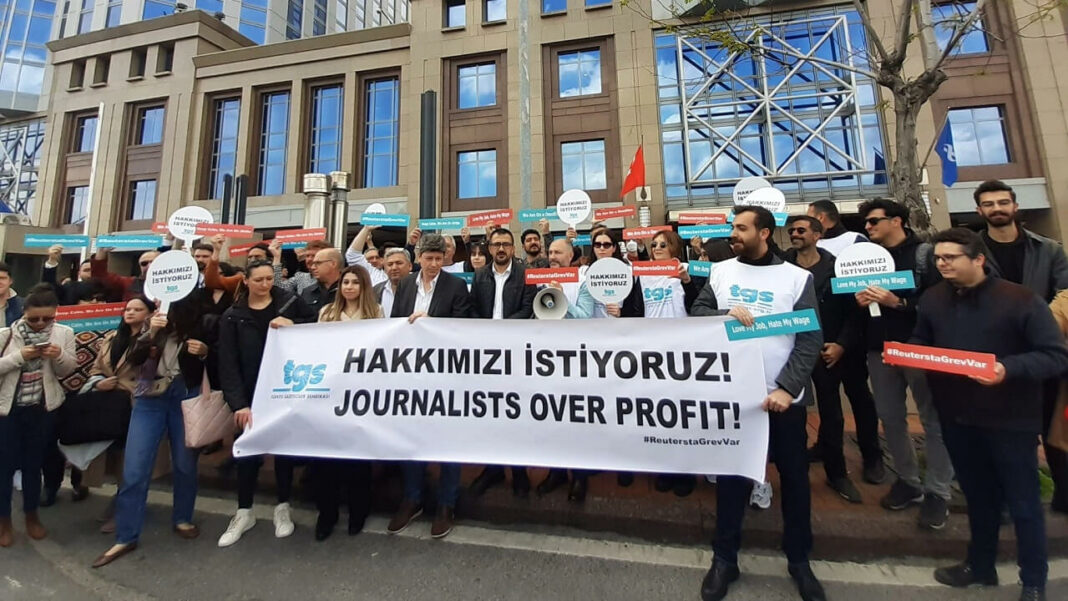Journalists at Reuters news agency’s Ankara and İstanbul offices have decided to go on strike on May 10 since their collective bargaining negotiations ended in a deadlock, the state-run Anadolu news agency reported.
Owned by Thomson Reuters Corporation, the news agency is one of the largest in the world, employing around 2,500 journalists and 600 photojournalists in some 200 locations worldwide.
Journalists from the news agency in Turkey and members of the Turkish Journalists Union (TGS) gathered in front of Reuters’ Turkey office in İstanbul earlier this week and announced the decision in a press statement read by TGS chairman Gökhan Durmuş.
The TGS is the union that mediated the collective bargaining.
Saying that a 25 percent wage hike was deemed appropriate by the employer, Durmuş argued that the employees’ efforts were being ignored.
“Despite all our positive efforts and intentions during the collective bargaining that we started in January, and despite explaining the economic situation in Turkey in detail, unfortunately, we did not see a positive response. Not even a single point was added on top of the 25 percent increase,” Durmuş said.
He added that they would begin a strike on May 10 if they don’t receive a proposal for the salary increase their members deserve and if they don’t see a positive step from the employer to resolve the issue.
In line with Law No. 6356, TGS members posted a notice on the door of Reuters’ İstanbul office announcing that the strike decision will be implemented as of 10 a.m. on May 10 at the company’s İstanbul and Ankara offices, Anadolu said.
According to a report by the Gazete Duvar news website on Friday, Reuters had planned to bring 10 journalists in from abroad to work during the election period in Turkey.
The country’s presidential and parliamentary elections are slated for May 14.
Speaking to Gazete Duvar on the development, Durmuş said the move to bring in replacement workers during the strike was aimed at breaking it.
“Normally, in exceptional situations like elections, two or three people come from abroad. They do news analysis and follow the elections. But this time, a team of 10 people, including cameramen and editors, is coming. … If [they] come, the strike here will have no effect,” Durmuş added.
He further stated that foreign journalists who come to work in Turkey need to obtain a temporary work permit from the Presidential Communications Directorate, according to Turkish law and that Ergün Atalay, head of the Confederation of Turkish Trade Unions (TÜRK-İŞ), wrote to the Ministry of Labor about the issue in line with TGS’s request. The Ministry of Labor is expected to warn the Presidency of Communications about the matter, according to Durmuş.
The union head said that collective bargaining with Agence France-Presse’s (AFP) Turkey office also ended in a deadlock.
“We will also have a meeting with AFP on the third [of May]. They are bringing in journalists from abroad, too, but on this condition: If the strike is launched, all the journalists planned to come for the elections won’t come, [only] three of them will,” Durmuş said.
Turkish annual consumer price inflation dropped to 50.51 percent in March, easing ahead of the May elections, according to official data.
Inflation has been stoked by a currency crisis at the end of 2021 and it touched a 24-year peak of 85.51 percent in October. It fell sharply in December and eased only to 55.2 percent in February despite a favorable base effect.
The domestic producer price index was up 0.44 percent month-on-month in March for an annual rise of 62.45 percent, according to the data from the Turkish Statistical Institute (TurkStat).
However, the official rate of inflation is disputed by independent economists from the ENAG research group, which estimates that consumer prices in March stood at 112.51 percent, slightly lower than the 126.91 percent they reported in February.


